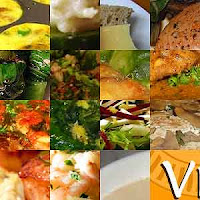 So many people are seeking low carb recipes to fit into their low carb diet. These need to be quick and easy to fit into busy lifestyles as well. Information is available from a number of different sources, particularly books and websites. Here are a few ideas to get you started:
So many people are seeking low carb recipes to fit into their low carb diet. These need to be quick and easy to fit into busy lifestyles as well. Information is available from a number of different sources, particularly books and websites. Here are a few ideas to get you started:First of all, wherever you are doing your research, you need to think seriously about the principles and rules of the low carb diet you have chosen. What is your maximum carb count? 20, 30, or 60 grams per day? How strict the carb count is will restrict or expand the amount of carb-substitutes you can use. The carb count will decide on how indulgent you can be with treats such as chocolate or fruit, as well as what veg to eat and which to avoid.
At the same time, a low carb diet is usually for life - as soon as you re-introduce a substantial amount of carbohydrate, any capacity for weight gain will be reactivated. There is no getting away from that - but take heart in that the low carb diet usually begins strict and then eases off and allows you to eat a few more carbohydrates in the later, maintenance stages. You should take advantage of the fact that low carb recipes can be really tasty as it is fat and not carbohydrate which imparts taste and texture to food.
Unless you want to live on plain pasta for the rest of your life, much tastier recipes involve low carb foods like meat, seafood, fish and poultry. Choose the tastier, more succulent cuts such as rib eye steak, trout, duck or goose. Some low carb diet regimes still insist you use lean cuts of pork or beef, but they miss the point: within reason, you can have fattier cuts of meat, and use olive oil fairly liberally in your salads (in comparison to the usual low fat diets). You should not be gorging yourself on fat, but don't go out of your way to avoid it, in fact, embrace it as much as possible.
Chefs have always had the advantage over those of us trying to cook allegedly healthy foods for home consumption. They always say they are cooking for special occasions, so they use butter and cream and goose fat and all the really tasty, yummy things most of us try to avoid in our cooking. No wonder their recipes taste so great! Well, take heart those of you who have adopted a low carb diet - all these low carb recipes are now available to you for home cooking. Rich creamy sauces, succulent fatty meats, lovely unctuous stews. Just avoid the potatoes or dumplings or pie crusts which might accompany them in their original incarnations.
Fiber is also an important ingredient. In the US, carb counts also include fiber, so you should look for the split between net carbohydrates and fiber. For example, flaxseed flour, used in low carb recipes for bread, is almost all fiber - and this is a good thing for bowel health as well as filling you up with "good carbs" which do not have to be avoided on low-carb diets. It's the starchy, sugary carbs you need to steer clear of, that contribute to your carb count.
In conclusion, look through your cookbooks and use all the meat, poultry, fish and egg recipes but avoid any flour, pastry, potatoes, dumplings, pasta, rice and regular bread. Explore high-fiber substitutes for carb foods in your low carb recipes - enjoy your food immensely and still stick to your low carb diet.


